Banking group IIF issues warning on record levels of global debt
The chief executive of the global banking industry’s premier trade group expects 2024 to be “a challenging year,” warning that policymakers need to urgently tackle record levels of global debt.
“We have a debt problem globally,” Tim Adams, CEO of the Institute of International Finance, told CNBC’s Silvia Amaro at the World Economic Forum in Davos, Switzerland.
“We have the highest levels of debt in a non-war period in modern history, and it’s at the corporate, household, sovereign, sub-sovereign [levels],” Adams said.
“We have a huge fiscal problem everywhere, including the U.S. We’re running [a] deficit at 7% of GDP. We need sobriety, and we need to focus on how we are going to get our fiscal house in order,” he added.
— Sam Meredith
China’s economy grew by 5.2% in 2023, Premier Li Qiang says
Li Qiang, China’s premier, delivers a special address on the opening day of the World Economic Forum (WEF) in Davos, Switzerland, on Tuesday, Jan. 16, 2024.
Bloomberg | Bloomberg | Getty Images
China’s economy grew by an estimated 5.2% last year, according to Chinese Premier Li Qiang, according to an official translation of an address at the World Economic Forum in Davos. This was higher than its 5% target, Li said.
“In promoting economic development, we did not resort to massive stimulus, we did not seek short-term growth … rather we focused on strengthening internal drivers,” he said.
China’s contribution to world economic growth is around 30%, he added, and he described the country as having made “steady progress.”
“The Chinese economy can handle ups and downs in its performance. The overall trend of long-term growth will not change,” Li said.
China GDP figures for the fourth quarter are due to be released on Wednesday.
— Lucy Handley
Russia is ‘failing’ on its strategic goals, EU chief says
European Commission President Ursula von der Leyen looks on during a press conference.
John Thys | Afp | Getty Images
Russia is “failing” both militarily and economically, European Commission President Ursula von der Leyen said Tuesday.
“Russia is failing on strategic goals,” von der Leyen said at the World Economic Forum in Davos, Switzerland.
“It is first and foremost a military failure,” she said, noting that Ukraine has thus far retained its “freedom and independence” in its near-two year war with Moscow.
“Russia’s failure is also economic,” she said, highlighting the impact sanctions have had in isolating the country from trade with Western allies.
“Russia is now dependent on China,” she said. Ukraine, meanwhile, is “closer than ever” on its path toward joining the European Union, she added.
— Karen Gilchrist
China’s premier tells Davos that innovation shouldn’t be used to restrict other nations
Li Qiang said that tech innovations should not be used as a way to restrict or contain other countries.
“To keep the competition healthy and bring out the greatest vitality, the only way is to enhance cooperation,” Li said Tuesday at the World Economic Forum in Davos, Switzerland.
Read the full story here.
—Evelyn Cheng
China has proven that it is a country ‘worthy of trust,’ says Chinese Premier Li Qiang
Chinese Premier Li Qiang told an audience at Davos that China has proven to be “worthy of trust” and urged countries of “all sides” to treat each other with sincerity, in an official WEF translation of his speech.
Trust between countries has enabled globalization in the past decades, he said, but added it has more recently “been eroded.”
Li proposed five ways to rebuild trust, with strengthening macro-economic policy co-ordination his first point. “In the face of global crises, fragmented and separate responses will only leave the world economy more fragile,” he said.
He also called for countries to strengthen industrialization to “keep supply chains stable and smooth,” as well as co-operating on science and technology to let innovation “flow.” Green development and reducing the divide between developed and developing countries were his final points.
Li heads China’s State Council, the country’s top executive body.
— Lucy Handley
Business outlook to improve in the latter part of the year, EY CEO says
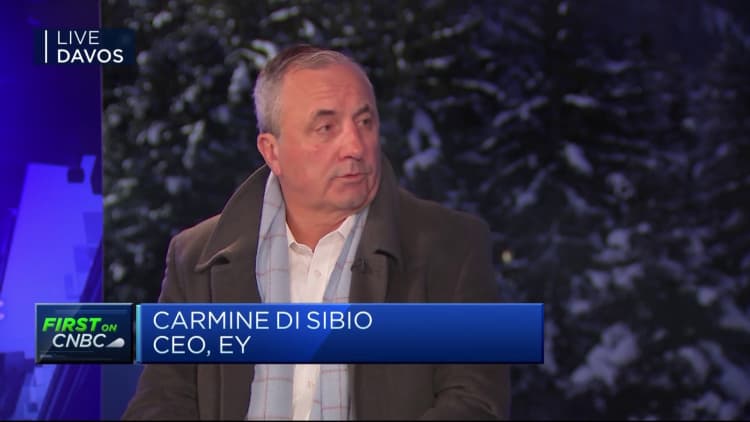
2024 will be a “mixed year” for investment, with the picture set to improve in the second half of the year, EY CEO Carmine Di Sibio told CNBC in Davos, Switzerland.
“We think the latter part of the year, things will get better,” he said, stressing that “between now and June, things remain tough.”
In that same tone, he played down a perceived burst in toward the end of 2023, noting that “some of the equity markets were a little exuberant, just before Christmas, because I do think there’s still some time to go.”
The macroeconomic outlook remains guided by uncertainty over when central banks will begin to reduce their interest rates, following multiple months of hikes in response to soaring inflation. Di Sibio signaled that, once that the highly anticipated rate cuts become “definitive,” the company’s clients will resume higher investments, predicting that “globally things will change.”
He also recognized that geopolitics are impacting the business landscape, including supply chain concerns.
— Ruxandra Iordache
There are ‘signals’ around rate cuts, but ‘the question is when they would start,’ says Nasdaq CEO
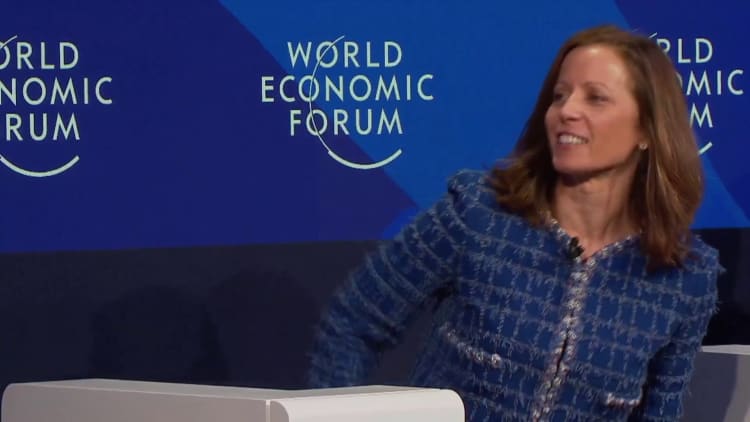
Nasdaq CEO Adena Friedman said markets have predicted that there will be interest rate cuts, and added she would be “a little concerned” about doing so too early, speaking on a CNBC-moderated panel at Davos.
The Federal Reserve Bank is likely to want to get to a state of stability before it makes significant moves, Friedman added.
UAE keeps eyes on ambitious growth target
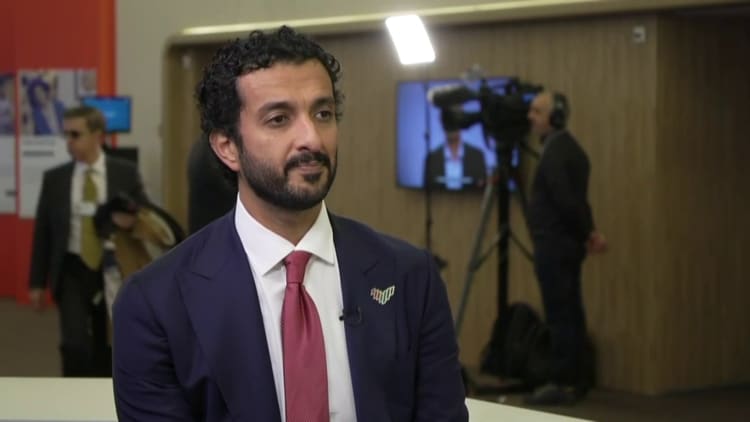
UAE Economy Minister Abdullah bin Touq al Marri has doubled down on Abu Dhabi’s intentions to chase economic growth of 7% of the national GDP in 2024, with a focus on expanding the country’s revenue streams.
“On non-oil GDP we’re doing really above 5% and really diversifying our economy,” he told CNBC in Davos, Switzerland. Traditionally reliant on crude and oil product sales, the UAE has embarked on an ambitious journey to swell its economy and hit a targeted GDP of 3 trillion dirhams ($817 billion) by 2030.
Al Marri referenced Abu Dhabi’s efforts of the past three years to deregulate company law and give a full 100% ownership to foreign stakeholders, as well as revamping the country’s visa regime to appeal to global investors.
— Ruxandra Iordache
Private company valuations are ‘going nuts again,’ Cisco CEO says
Cisco CEO Chuck Robbins participates at the World Economic Forum in Davos, Switzerland, on Jan. 18, 2023.
Hollie Adams | Bloomberg | Getty Images
The valuations of some private companies are ‘going nuts again,’ according to Cisco‘s chief executive.
Chuck Robbins said the valuations for companies focusing on new technologies, such as artificial intelligence (AI), had returned to the heyday seen during the low interest rate environment of the pandemic.
“When you get into [generative] AI and some of these other things, we are seeing some of the private valuations are going nuts again,” he said during a CNBC-moderated panel event at the World Economic Forum in Davos, Switzerland.
“It is ironic to me that we’re so quickly doing this after what we experienced 48 months ago. It’s just incredible,” he said.
— Karen Gilchrist
IPO market might open back up in the second quarter, says Nasdaq CEO
Adena Friedman, CEO of Nasdaq, at the WEF in Davos, Switzerland on May 24th, 2022.
Adam Galica | CNBC
Adena Friedman, chair and CEO of Nasdaq, said the market for Initial Public Offerings (IPOs) could “open back up again” as investors gain confidence in the second half of the year.
“What happens in the markets — as a result of this notion that there could be a lower cost of capital as we go through the year — is that investors can start to think about how they model company earnings again,” she said, speaking on a CNBC-moderated panel.
While last year’s market performance was “top heavy,” the broader market including small cap companies are starting to see improved valuations, Friedman added.
“They know that the cost of capital is likely to be stable to lower going forward, and I think that will also drive an interest in investors wanting to put risk capital to work which means IPOs … we could actually have an IPO market open back up again,” she said.
Around 85 companies have filed to go public on Nasdaq which want to go public, with activity concentrated in the second quarter, Friedman added.
— Lucy Handley
IMF expects interest rates to come down in the second half of the year
Gita Gopinath, first deputy managing director of International Monetary Fund (IMF), spoke to CNBC at the ECB Forum in Portugal.
Bloomberg | Bloomberg | Getty Images
It is “premature” to conclude that central banks will cut rates “aggressively” this year, according to Gita Gopinath, first deputy managing director of the IMF, speaking on CNBC’s “The High Rate Reality” panel at Davos.
While inflation has come down, “the job is not done,” she added, with tight labor markets in the U.S. and Europe. The IMF expects interest rates to come down in the second half of the year.
Compared to the period after the global financial crisis in 2008, Gopinath said she expected rates to be higher in the next three to four years.
— Lucy Handley
ECB member de Galhau: We are not calendar driven, we are data-driven
Francois Villeroy de Galhau, governor of the Bank of France.
Bloomberg | Bloomberg | Getty Images
French central bank chief François Villeroy de Galhau stressed that it was not possible to say in which season the European Central Bank may cut interest rates this year.
“About the season, why don’t I say anything? I said it should be this year, barring major surprises. But…we are not calendar driven, we are data-driven,” he said during a CNBC-moderated panel event at the World Economic Forum in Davos, Switzerland.
On the path of inflation, he added: “It’s too early to declare victory … the job is not yet done. That said, interest rate tightening has been quite successful so far, more successful than we thought even at Davos one year ago.”
“What we can see on both sides of the Atlantic is something like a soft landing so far.”
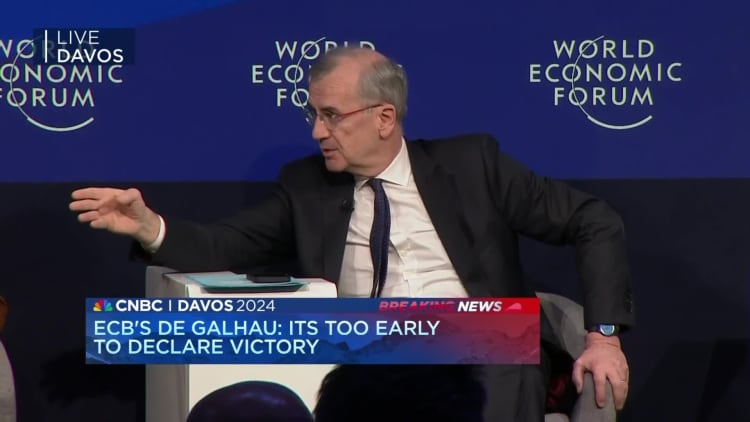
European Central Bank’s Centeno highlights inflation progress in euro zone
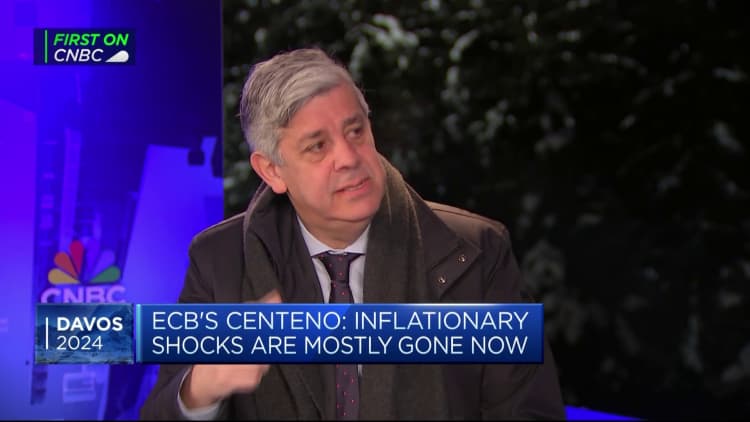
Inflation in the euro zone has been on a “very positive” trajectory, Portugal’s central bank governor Mario Centeno said Tuesday, even as his peers on the European Central Bank Governing Council struck a more hawkish tone in recent days.
“We remain data dependent, that’s how we frame our decisions … One of the greatest successes of the ECB lately is being able to anchor expectations for inflation in the medium term at 2%, and this is because we are credible, we have to remain so,” Centeno said.
— Jenni Reid
Global leaders discuss ‘The High Rate Reality’
Join CNBC at 7.15 a.m. U.K. time where anchor Steve Sedgwick will moderate a panel on “The High Rate Reality,” with guests Adena Friedman, CEO of Nasdaq, Gita Gopinath, the first deputy managing director of the International Monetary Fund (IMF), Chuck Robbins, chair and CEO of Cisco and Francois Villeroy de Galhau, governor of the Bank of France and board member of the European Central Bank (ECB).
The European Central Bank may hold off starting interest rate cuts in 2024, upending market expectations, with Governing Council member Robert Holzmann saying on Monday that those who hoped for rate cuts to start this spring would leave Davos “deeply disappointed.”
The panel will talk about whether high rates will become the “new normal” and what that means for markets.
Headline inflation rose to 2.9% in the euro zone in December, up from 2.4% the previous month. The ECB targets inflation at 2%.
— Lucy Handley


